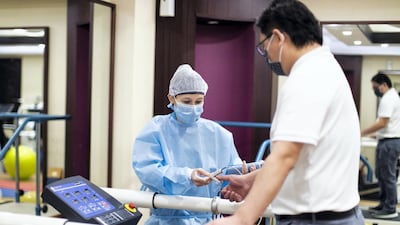Perfume that smells like sewage and food that seems to have gone off: the UAE's long Covid-19 victims are still suffering.
Patients who recovered from the virus months ago remain afflicted by debilitating symptoms.
Many say their senses remain badly affected, with products such as soap and perfume seeming to have foul odours and regular food items smelling as if they have gone bad.
"My sense of taste and smell are back by around 60 to 80 per cent but about a month ago food started smelling bad, like it is rotten," said Vladimir Vukovic, who teaches calisthenics, a form of street gymnastics, in Abu Dhabi.
"Food like onion, garlic, meat, eggs and anything with spices smells unpleasant."
Mr Vukovic tested positive in January and was cleared 10 days later. But the 26-year-old Serb said he is still struggling with lingering effects.
It has even affected his appetite and he has lost weight.
“The unpleasant smell is the worst that could happen. We all want to enjoy food," Mr Vukovic said.
It is a similar story for Dr Tamer Abbas Saafan. A week after recovering from Covid-19 last September, Dr Saafan, 42, noted his shower gel smelt strange.
"The first time it happened was when I smelt something unpleasant after taking a shower," said the Ajman-based surgeon. "But I dismissed the idea."
When it happened again, he tested his sense of smell on his wife's perfume, hand soap and air fresheners. The result was similar – they all smelt bad, like sewage.
“Not all perfumes but the majority of them: air fresheners, oud and hand soap,” Dr Saafan said.
He steps out of the way when someone wearing strong perfume or oud passes by, while he and his wife have changed several items that smelt bad.
"When I realised I smelt things differently, I read about it. There is nothing that says when or if it will return to normal," said Dr Saafan, who otherwise suffered only a two-day fever after catching Covid-19.
“But it's fine, I kind of adapted to it.”
Mr Vukovic, however, said he does not consider himself recovered but noticed an improvement after he travelled to Serbia for a holiday recently.
“When my mother took care of me, it started getting a bit better – considering the delicious food she made me. But it is still there."
Mr Vukovic said he even knows of some patients who have been suffering longer than him.
“You know when you hear lot of different stories of people having this issue for even a year or so?
"There are lots of ups and downs with it. But I do really hope I will recover soon."
The plight of both patients lays bare how coronavirus long haulers are still plagued by health issues long after testing negative.
Aside from loss of smell and taste, insomnia, depression and chronic fatigue are some of the long-term conditions reported by long Covid patients receiving care at RAK Hospital in Ras Al Khaimah.
Medics are still studying the long-term effects of the virus but the loss of taste or smell in the longer term is rare, they believe.
“I have seen only two or three cases here in our clinic and they were all over 60 or had severe, chronic conditions such as hypertension," said Ruba El Hourani, head of nutrition at RAK Hospital.
"It is usually only seen in older patients who had severe symptoms and required hospitalisation."
Ms El Hourani works with patients recovering from Covid-19, particularly the elderly who need home support.
“During their hospitalisation they either completely lost their sense of smell or it was sharp to the extent they noticed a strange metallic taste in their food," she said.
“If it was hot or cold food, it was the same. Even fruit was tasting like grass in some cases, which was unusual."
Ms El Hourani said most recovered quickly but there was still no clear explanation as to why this happened with Covid patients.
"It is not uncommon to have a loss of taste or smell with a heavy cold or flu," she said, particularly with older patients.
“We know the elderly begin to lose the sense of smell and taste with age, so it is not unsurprising that this is more common in older people who have had the virus.”














